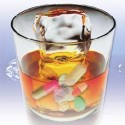Avoiding alcohol's temptations in 'overwhelming' war zone
KANDAHAR, AFGHANISTAN
— Once each week, in a fluorescent-lit room in a stout building near the heart of Kandahar Air Field, a multinational mix of troops and civilians gather to take on a battle that can’t be fought with conventional weapons.
Sitting around a table, or on overstuffed furniture, they talk about bad days, frustrating bosses and how it is that a fellow soldier can become a drunk on a dry base in a mostly dry country.
Called Sober in the Sand, the group is this base’s own chapter of Alcoholics Anonymous. For many who spend much of the year living abroad in Afghanistan, their weekly meetings have become a lifeline to staying sober far from the supports of home.
Jennifer, a 31-year-old from Winnipeg, has been sober for 10 years. Still, when she arrived to work at the base five months ago as a civilian, she was anxious about the strain that living in a war zone might cause.
“It’s not like I’m shaking for a drink all the time,” she said.
But she added that the base, which serves as a temporary home for more than 10,000 people from dozens of countries and is the frequent target of insurgent rocket attacks, can be “overwhelming” at times.
“It’s a really crazy place.”
That craziness was tempered, though, when she walked into her first AA meeting.
Instantly, she felt she belonged.
“There’s a base level of understanding between alcoholics. They know you, you know them. It’s almost like family.”
The group operates like most conventional AA groups, meeting once a week and setting up links between new recovering alcoholics and those with more sober years under their belts. But there are unconventional elements that come with operating in a war zone.
“Here we worry about our fellow alcoholics going out and not coming back alive, which is a little harder to deal with,” said Ed, a 47-year-old mechanic from Midland, Ont.
Typically, the group has about five regular members, but has swelled to more than 15 at different times.
Often, the group will gather for special meetings if soldiers are coming through who are normally stationed off base at one of the smaller outposts.
“If they need a meeting, well, darn it all, somebody should be there,” said Ed, adding that those who come to the AA group for support but have to leave to work off base are usually given literature, including copies of The Big Book, a step-by-step guide to getting sober that explains the Alcoholics Anonymous tradition.
“My book I was carrying around for 14 years went out to a forward operating base with them,” Ed said. “If you have no meetings out there and guys at least have something to read, at least you have some comfort.”
John, a 31-year-old U.S. Army soldier from the Bronx, said it took some work to find the AA meetings when he arrived on base.
At times the program has nearly faded away, largely because of the transience of people at the base. But it has always been revived.
“People are not only coming here to talk about problems with alcohol,” he said. “We come here for peace of mind. I’ve actually had the opportunity to help people.”
For that reason, no matter how many troops and contractors move on and off the base, the group will always exist, said Chuck, a 55-year-old civilian from Minnesota who with 26 years of sobriety, is the unofficial dean of Sober in the Sand.
“AA is a program of principles. If everybody shipped out, the next recovered alcoholic coming through Kandahar would initiate it again.
“This meeting will always be here after we’ve gone. The AA will keep reconstituting itself, just like the Taliban.”
source” Globe and Mail
